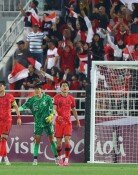Ruling Camp Lifts Limit on `Time-off` Labor System
Ruling Camp Lifts Limit on `Time-off` Labor System
Posted February. 08, 2010 09:08,
A limit on the number of paid staff solely for union work was removed yesterday after a discussion between the government and the ruling Grand National Party.
The decision invited an immediate backlash from employers, which claimed the move will raise the number of such employees. A heated dispute is thus expected ahead of the state affairs meeting tomorrow, when the provision will be finalized.
According to the Strategy and Finance Ministry, the Labor Ministry and the party, the ruling camp in a closed meeting agreed on removing a provision limiting the number of employees on the time-off system.
The system bans wages for employees solely dedicated to union activities, but allows pay for key work needed at labor negotiations, including consultation, complaint handling and industrial safety from July 1.
Approved by the National Assembly Jan. 1, the law on the time-off system mentions nothing on the maximum number of employees under the time-off system, so the decision reflects the Government Legislation Ministrys deliberation that an enforcement provision, which is below labor law, cannot stipulate a specific number.
After hearing of the change through unofficial channels, the Federation of Korean Industries and the Korea Employers Federation said in a statement, Without a legal provision to limit the number of union-dedicated employees, extensive labor-management conflict could occur.
According to the planned provision announced Jan. 11, employers can set the number of time-off employees by allowing a number of paid working hours per month and assigning three to four of the employees to the time-off system.
Without the provision, however, 10 of them could split paid working hours for union activities, something that could raise the number of time-off staff.
The government apparently sees that the increase in the number of time-off employees will stay reasonable since employers can set a specific number of time-off hours and employees through the time-off deliberation committee, which holds legal authority on the matter.
A source at the Federation of Korean Trade Unions said, If the provision limits the number of time-off employees though a union has the ability and commitment to run the time-off system in a reasonable manner, it could hinder flexible union activities.
legman@donga.com sys1201@donga.com
Headline News
- Med professors announce intention to leave hospitals starting Thursday
- Bridge honoring Sgt. Moon Jae-sik unveiled in Pennsylvania
- Chief of Staff Chung tells presidential secretaries to stay away from politics
- US FTC bans noncompete agreements
- N. Korea launches cyberattacks on S. Korea's defense companies







